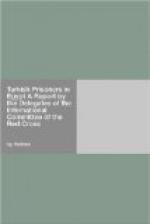At the infirmary, which is clean and well looked after, all prisoners not seriously ill are accommodated with beds having mattresses and steel springs. The consulting room is well supplied with medicines. Serious cases are sent to the hospitals set apart for prisoners of war.
From 20 to 30 men come to the infirmary daily for medical attention. All the cases are entered in a register, which we have examined; after each name is the complaint and the treatment prescribed.
At the time of our visit there were six lying-down cases in the infirmary; two with tuberculosis in the first stage (prisoners captured recently at El Arish); one with diarrhoea; one with conjunctivitis; one with malaria; and one with a wounded leg.
Of the prisoners in camp 3 per cent. have been attacked by malaria—old cases from the marshy districts of Turkey, such as Angora Yosgath, for instance. Nine per cent. have been attacked by chronic bacillar dysentery; these are treated periodically with anti-dysenteric serum. Some cases of amibian dysentery are being treated with calomel, salol, and emetine. Twenty per cent. were affected by ophthalmia due to their stay in the desert before being captured. These were treated with sulphate of zinc and protargol.
Four prisoners are suffering from trachoma of old standing. Recent cases are ordinary ailments, bronchitis and simple diarrhoea.
As a general rule the camp prisoners look well, have a good colour and are well nourished.
The prisoners were inoculated in Turkey against typhoid fever and smallpox. All who no longer showed traces of vaccination were vaccinated immediately after being captured. They were also inoculated against cholera.
There is no typhoid fever in the camp, nor exanthematic typhus, nor any other infectious disease.
Work.—The prisoners have no regular work to do. No prisoner is employed in workshops outside the camp. Even inside, except for ordinary camp fatigue duties, and some light gardening, no labour is exacted. During our inspection we saw the digging for a water supply through the camp being done by Arab workmen, not by prisoners.
In any case, corporals and sergeants are not allowed to work.
Religion and Recreation.—The prisoners are quite free to follow their own religious practices, which are performed thrice a day ordinarily, and six or seven times daily during Ramadan. Music and singing are permitted; prisoners have manufactured several guitars and violins.
Correspondence.—Most of the prisoners brought money with them; some have received sums of money from their families through the Turkish Red Cross and the International Committee of the Red Cross. They receive the amount in weekly instalments of 30 piastres (about 6 shillings) per month. Each person has a separate current account with the camp accountant.
Letters take from three weeks to three months to get from the sender to the prisoner to whom they are addressed. Some of them are sent through the American Consul at Cairo. Very few of the prisoners can write, but these may do so as often and for as long as they wish. There is no system of delaying correspondence after delivery or before despatch.




